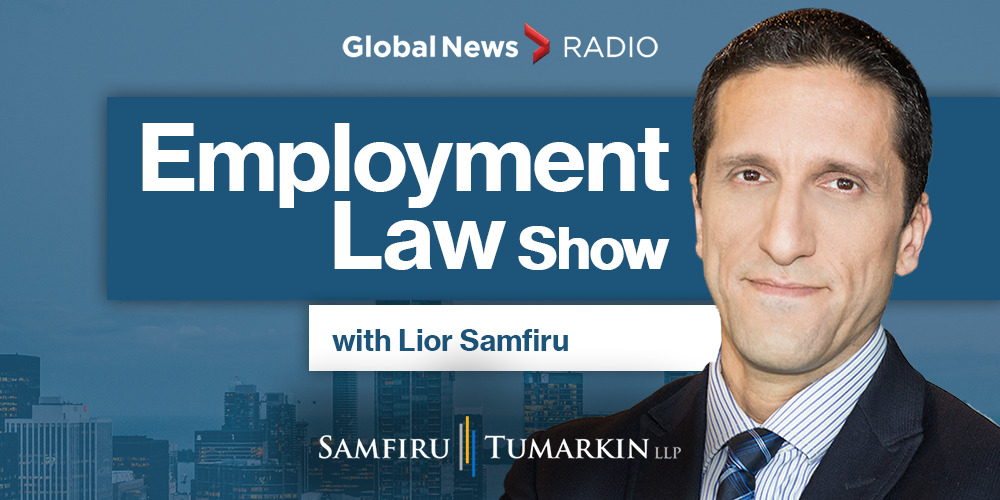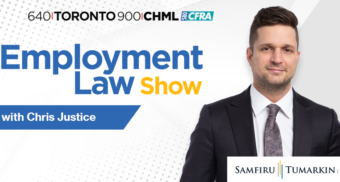Employment Law Show 640 Toronto – S10 E05

Episode Summary
Top questions and answers about medical leaves from work, federal vaccine mandates, paid sick days, and more on Season 10 Episode 05 of the Employment Law Show on Global News Radio 640 Toronto.
Listen below as Employment Lawyer Lior Samfiru, Partner at Samfiru Tumarkin LLP, reveals your workplace rights in Toronto, the GTA, Hamilton, London, and across Ontario on the Employment Law Show. Lior shatters myths and misconceptions about severance pay, terminations, workplace harassment, overtime pay, wrongful dismissal, constructive dismissal, duty to accommodate, independent contractors, and more.
Listen to the Episode
Episode Notes
I’ve worked for a bank for 20 years, and recently they asked all employees to sign a form confirming their vaccine status. When I refused, they put me on an unpaid leave. Can they do that?
Employers are not allowed to put employees on unpaid leave. Your employer has already conceded to allowing unvaccinated employees to work in the office so long as they commit to testing, so it does not make sense that they are asking for employees to declare their status. If you are put on an unpaid leave because of your vaccine status you are owed severance. Since you’ve been with the bank for 20 years, you could be owed as much as two years’ pay.
This week my employer asked everybody in the company to acknowledge and agree to their COVID-19 vaccination policy. Is this a way of getting employees to agree to a new employment contract?
No, this is not a new employment agreement. I haven’t seen the agreement, but if it simply deals with the vaccine, then it is not an employment agreement and it only applies to the vaccine. If you sign it, then you have given your consent to agree to the policy. You need to ask yourself if you agree with it, and whether you’re willing to abide by what it says. If you are ok with it, then you can go ahead and sign it.
My coworkers and I were called into a meeting and let go. My employer said they found us new jobs at another company, but if we want those jobs we have to agree to quit and forego severance. Can they do that?
Your employment is terminated – your employer cannot relieve itself of its severance obligations by forcing its employees to resign. The only time you quit is if you do it voluntarily, or your own free will, not because someone threatened you or gave you an ultimatum. You should absolutely not quit, and you are entitled to severance.
Last year the federal government announced that they would be implementing a vaccine mandate for federally regulated workplaces. Do you know what’s happening with that?
The government has not provided any follow-up information about when or how they will apply a mandate if there is one, and what it will say. Even if they do implement a mandate, there may be exceptions to it or options for employees. If they implement a mandate without any options and say that employees have to be vaccinated or they’ll be let go, then an employee who refuses to get vaccinated could be let go and would not be owed any severance.
LEARN MORE
Federally Regulated Employees and Mandatory COVID-19 Vaccination Policies
I’m not feeling comfortable about going back into an office. If we’re recalled to the office, do I have an obligation to have to go back into the office?
Yes, you do have an obligation to go back to the office, if before the pandemic your job was to work in an office, and as long as your employer is allowed to have employees in the office. If your employer asks you to return to the office from remote work, and they are complying with all of the government-regulated health and safety regulations, if you don’t go back you will be considered to have resigned. Your best option right now is to speak to your employer and see if you can work something out, maybe make arrangements to work from home a little while longer. You can see if they will be flexible about the issue.
I get two paid six days a year. If you’re sick for more than two days, do you have to start using your vacation days?
It is legal that an employer is not required to provide sick days, and an employer can decide when you get to use your vacation days. Although as it relates to COVID-19, the government of Ontario has implemented the three paid sick days that the government pays for, so you’re entitled to get paid for that if you were off due to COVID-19. From a legal standpoint, an employer can make you use your vacation days if you’ve used up your sick days.
LEARN MORE
Sick Days in Ontario
Is it mandatory for an employer to either hold back the percentage owed in vacation pay or pay it on every paycheck?
Your employer gets to decide whether they’re going to add vacation pay to every paycheck or simply hold it back and pay it to you when you actually take a vacation. So those are the two options and it’s the employer’s decision as to which way they do it. But one way or another they do have to pay vacation pay whether it’s every check or when you actually take the vacation.
Top Questions and Answers about Medical Leaves
#1 – If someone has to be away from work for medical reasons, what do they have to do?
All you have to do is get a note from your doctor explaining that you need to take a medical leave. If you have that, and you present that note to your employer, there is nothing your employer can do about it. There also does not have to be an end date for the prescribed leave.
WATCH MORE
Medical Leave: What You Need to Know
#2 – How long can someone be off on a medical leave?
There’s no time limit to how long you can be off on a medical leave. You can be off as long as you need to in order to get better, if that’s what your doctor says. You can take a leave for a few days, weeks, months, or even a year or more. All that matters is that you have your doctor’s support.
#3 – Does an employee have to go back to work after they’ve used up their sick days?
Having sick days does not have anything to do with being on a medical leave. It only means that you will get paid for those sick days that you use, and you won’t get paid for any additional days that you take for a medical leave. But the number of sick days has nothing to do with how long you can be off. You could potentially be off for work for two years if you needed to be, and the number of sick days would not impact that in any way.
#4 – What happens to an employee’s job while they’re on a medical leave?
What happens is that an individual remains an employee while on a medical leave, on an ‘inactive’ status. When an employee is ready to return to work, the employer has to make all reasonable efforts to try to bring you back, either to the same job, or if that job doesn’t exist anymore, to a different job. If the employer has tried to find a job for you and there is literally nothing available anymore, at that point they can terminate you, but they must pay you severance. An employee shouldn’t worry about their job until they are ready to come back to work.
LEARN MORE
Return to Work and Long-term Disability FAQ
#5 – Does it matter if your employer has or doesn’t have a disability plan when you go off on a medical leave?
Many employers have a disability plan. Most employees have short- or long-term disability plans as a part of their benefits package. If your employer has that, and you need to be off work, you should apply for that right away. But even if your employer doesn’t have a disability plan, it has nothing to do with whether you’re allowed to be off. You may not get disability payments from an insurance company, and you may be limited to benefits available through the government, but you can still take a medical leave.
#6 – What is an employer allowed to ask for with respect to an employee’s medical condition?
Employers are not entitled to ask or know what an employee’s medical condition is, what treatment they’re getting, or what specialist(s) they’re seeing. They do not have a right to know any of the particulars of an employee’s medical condition – it is irrelevant. What is relevant is whether or not an employee is able to work. This is what we call the distinction between prognosis and diagnosis. Your employer is allowed to know your prognosis – whether you can work, how long you’re going to be off, and whether or not you’re going to need any accommodation in the workplace. But an employer is not allowed to know your diagnosis – your medical condition or treatment, and you cannot be punished for refusing to provide that information.
#7 – Does an employee have to answer an employer’s request for medical information?
As long as an employer’s questions are legitimate, then yes, the employee does need to answer. If the employer asks how long an employee will be off, or if there is another job they could let the employee do to accommodate them, or if they request an update, those are all legitimate questions the employee should attempt to answer, or get an answer from their doctor. If the employer asks what your medical condition is, you can tell your employer you will not answer the question, because it is irrelevant.
#8 – Can an employer require an employee to attend an Independent Medical Examination (IME)?
No, an employer cannot demand that you see another doctor. Your employer does not get to say that they don’t agree with your doctor. If they have questions for your doctor, it is legitimate for them to ask for clarification – that’s allowed.
LEARN MORE
Independent Medical Examinations (IME) and Long-term Disability FAQ
#9 – Does an employee have an obligation to update their employer about their medical condition?
If you’re going to be gone for longer than a week, then it is a very good idea to keep your employer updated. It doesn’t have to be a long explanation. Just send your employer a quick email once a month and let them know you’re working on getting better or getting treatment, and that you’re hoping to be back at work at some point if that’s the case. You don’t want them to forget about you, and you don’t want them to think that you’ve just quit your job and moved on.
#10 – What should someone do if their disability insurer threatens to cut off an employee’s benefits?
It is very common for long-term disability insurance companies to either deny claims at the outset or to approve them but then threaten to cut the employee off. Many individuals feel that when that happens there are no options. Some insurance companies will deny or cut-off benefits and suggest that the individual make an appeal. But appeals are rarely successful. It’s important that you reach out to our firm if this has happened to you, and we will deal with it successfully and get you the compensation you’re owed.
LEARN MORE
Appeals and Long-term Disability FAQ




